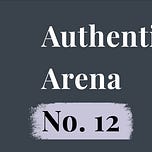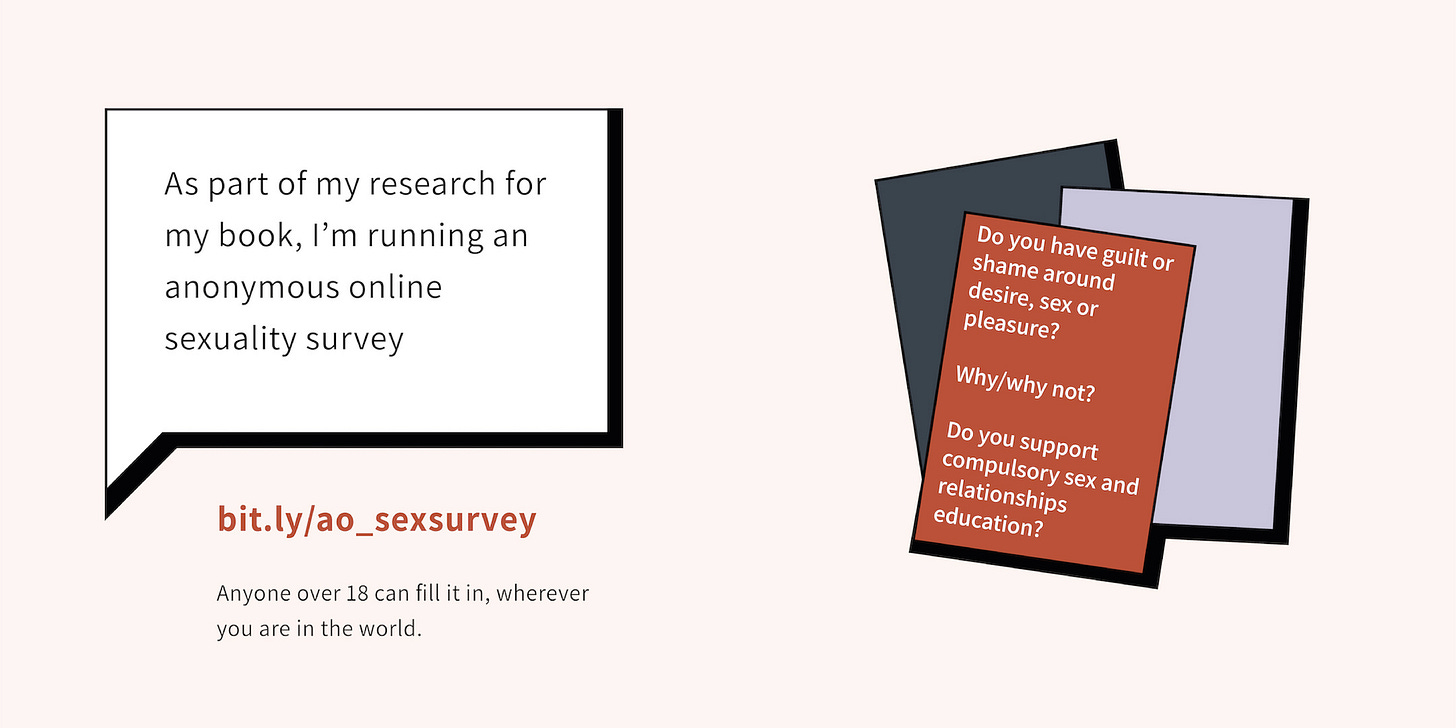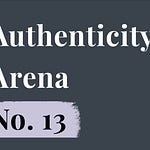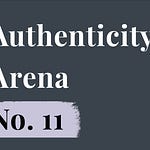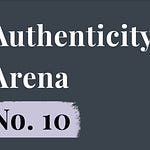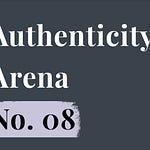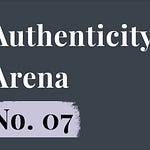This content is free, but it takes time to create and upload each piece. I know that hundreds of you open and read these mailouts month after month, after month (as Substack provides stats reporting), so if this project is something that you value, please consider becoming a paid subscriber of ‘She Dares to Say’.
If you would prefer to make a one-off donation, feel free to send a contribution via PayPal.
You can also show your enjoyment without spending £££, by liking, commenting or sharing 😃
[Image description: Text: ‘Authenticity Arena No. 12’ on a navy blue background with a lilac paintbrush stroke highlighted segment]
Almaz note: Please do listen to the audio extract, while simultaneously following the text transcription, as it makes for a richer experience.
The audio recording (above) and transcript (below) represent 13 minutes of a background research interview (rather than sexuality survey follow-up chat) I set up with ‘N’, who’s a white Northern Irish gay man (cis), who, at the time of interview in July 2021 was 31, single and living in Belfast.
‘N’ responded my shout-out for people who fancied being interviewed about their relationship with gay dating app Grindr. The interview extract I’m sharing here gives some insight into how some millennials have engaged with dating app culture in the decade that’s passed since they became mainstream, and how app-based dating can flatten the way we conceive of notions such as attractiveness and masculinity.
Almaz – 00:04mins
Okay, so, um, how long have you been a Grindr user for? For how long have you been a grinder user? Let me get my grammar correct.
‘N’ – 00:18mins
Urm, so, before Grindr. There was a website called Gaydar.
Almaz – 00:27mins
Oh yeah.
‘N’ – 00:28mins
I don’t know if you know of it? And so, I would say I went on Gaydar for the first time when I was probably about 16. So, I’m 31 now.
Almaz – 00:241mins
Yeah.
‘N’ – 00:41mins
It’s like, what, 15 years ago, quick math. And I… then whenever smartphones became, like, quite readily available, probably when I was like… I remember having an iPhone 4S, and having Grindr. And that was around 2010 / 2009.
Almaz – 01:03mins
Mmm.
‘N’ – 01:03mins
So, I dare say, like, more than a decade. Longer than a decade.
Almaz – 01:10mins
Yeah. Okay, so what were the differences that you noticed about your engagement with the platform when it came out, as opposed to Gaydar.
‘N’ – 01:31mins
Differences?
Almaz – 01:34mins
Yeah.
‘N’ – 01:34mins
So, while Gaydar was… Gaydar didn’t have a mobile app. And I think that’s probably why it doesn’t really exist any longer. It never really, sort of, like… What I’m trying to say “ride the wave”. You know what I mean, like…?
Almaz – 01:55mins
Yeah.
‘N’ – 01:55mins
…really, sort of got with the times. However, so basically, like, every stage was at my computer, or a laptop, you know, at home in my mum’s house. So you don’t bring them along with you everywhere. So, whenever, you know, the advent of smartphones came about. That’s whenever, sort of, Grindr really took over.
I guess, because, in terms of, like, limitations and engagement with Grindr. Or with Gaydar, rather, you were limited because, you know, it was only when you could catch your computer that… However, you have your smartphone on all the time. And I’ve actually noticed that over the years, I guess I would not be the only person to do this, but I’ve spent far too much the time on Grindr at points. So, I’ve probably developed a little coping mechanisms in order to ensure that my engagement with Grindr isn’t out of control.
Almaz – 03:05mins
Yeah.
‘N’ – 03:05mins
Such as, like, hiding the app in, like, an old folder in my phone, or turning notifications off. And deleting it every so often. But, sadly I always come back to it [sighs]. But, yeah, so engagement-wise, there’s definitely a disparity between the two.
Almaz – 03:32mins
Yeah. And it’s interesting that you said you’ve noticed yourself, maybe, spending a lot of time on it. At what stage did you really become aware that you were spending a fair bit of time on it?
‘N’ – 03:53mins
Definitely a long time ago. And I daresay, around the time, like, I actually… I’m looking at your piece here and noticing, like, you’re talking about the late 2010s and whatnot. And I… I was studying at a university in Liverpool around, like, 2009, 2010. I had an iPhone. On it all the time. And then it was only, sort of... And then I was also quite depressed.
Almaz – 04:26mins
Mmmmm.
‘N’ – 04:27mins
Like, there was a few things that I was doing that I really shouldn’t have been doing as well. Such as, like, recreational drug use and stuff. But it was whenever I started to realise that I needed to do something about my mental state that I educated myself on the psychology behind why people spend too much time on social platforms like Facebook, and Grindr, and whatever. And about how, like, these little dopamine rushes come every time somebody likes your profile, or likes a photo you’ve put up, or whatever.
So I think learning that really helped me start to, like, censor my amount of time on it.
Almaz – 05:18mins
No that’s really, really good because I have a feeling that if more of us were more self- aware of… Yeah, and, like, do the reading like you’ve done and read into behavioral patterns, it’s the dopamine hit that we get, a lot of us will be able to manage our addictive compulsions in a better way. Without them spiralling into, like, terrible addictions.
‘N’ – 05:50mins
Yeah, I agree, because I think, like, over the years I’ve developed a bit of a soft interest in psychology and, like, brain chemistry. But, like, what I’ve learned and, like, you know through like reading books and audiobooks and listening to podcasts, and YouTube videos and whatnot is that, like, it really all comes down to, like, dopamine.
Almaz – 16:16mmins
Mmm.
‘N’ – mins
Start with dopamine and, like, whether or not, my brain thinks “Right, have to go to the bank, there’s not as much dopamine there as there is stuff on Instagram. And then that’s where it’s, like, all this, sort of, states of, like, addiction and what not, all, sort of, congregate in the one area of the brain.
I think it’s called the amygdala. But yeah, like so… It’s just fascinating that [sighs] there’s just, I think what you got to go back to what you said. Sort of, like, it was, like, a light bulb going off in my mind and I was starting to think “Right okay, this is becoming a bit of a problem.” I need… I’m kind of aware that this is what to do, but then again it’s easier said than done.
Almaz – 07:09mins
Mmmm.
‘N’ – 07:09mins
Especially, like, whenever your phone’s in your pocket or, you know, like, something like sex is so intrinsic to… Like, the rush and the dopamine, you know, and something, like, as something as basic as reproduction and sex and your brain just wanting that, sort of, not to be the lonely as well so it’s such a complex…
Almaz – 07:31mins
Mmmmm.
‘N’ – 07:31mins
… avenue I think. I’m actually reading a book at the moment about it. It’s called Something For The Weekend or something.
Almaz – 07:42 mins
Oh, okay!
‘N’ – mins
And it’s about, like, the rise and problems coming from ‘chem sex’. And particularly among gay men, and they talk about how, like, you know, basically what has happened.
Am I going on?
Almaz – 08:00mins
No! This is fascinating! This is excellent!
‘N’ – 08:05mins
They talk about… The guy who wrote it actually used to be a soldier, and then he moved to London, got into the chem sex scene and became an addict quite quickly. And there’s lots of people that, sort of, specialists and professionals that he talks about for the book who document how it’s not only these people are becoming drug addicts, but they are sex addicts as well.
Because they learn to associate taking drugs with having sex, which is such, like, as I said, like, an innate desire, and it makes it all the more difficult to, kind of… And I think, again, going back to what you said, if people were more inclined to learn about, you know, sort of, the psychology behind why you do things and whatever, such as even reading a book like that, it would terrify you.
Almaz – 08:58mins
Mmmm. Mmmm. Mmmm. Yeah. I’m going to read it.
‘N’ – 09:04mins
You should. Something For The Weekend by James Wharton.
Almaz – 09:17mins
Okay. Great, great, great.
‘N’ – 09:21mins
It’s very good.
Almaz – 09:22mins
Okay, let’s move on to ‘Masc4Masc’ culture. And would you be able to describe to me what that means to you? Or how that phrase fits in with your experience of Grindr.
‘N’ – 09:46mins
Okay. So ‘Masc4Masc’, for me… ‘Masculine for Masculine’ are really, sort of, like rudimentary, basic, repugnant terms for, like, individuals that I find… I think…. Like, I experience it a lot on Grindr.
And I would, sort of, think, like, I feel myself that I am somewhat straight-passing. So I’m aware that there is a privilege that I am, you know…
Almaz – 10:28mins
Yeah.
‘N’ – 10:28mins
…I am… That I have access to that a lot of other gay men don’t. A lot of trans people don’t, and so on. So, I’m kind of aware of that. Especially considering, perhaps, maybe my… A few of my interests are, sort of, stereotypically straight.
Almaz – 10:49mins
Yeah. Yeah.
‘N’ – 10:50mins
You know, I think as time progresses we are getting away from that and people can like what they want. But, unfortunately, there’s this, kind of, real underbelly on Grindr and other apps and stuff where it’s men who like ‘masculine’ men.
Almaz – 11:12mins
Yeah.
‘N’ – 11:12mins
Whatever their brain has decided ‘masculine’ is. A lot of them, like you’ve mentioned, tend to, sort of, like, be based on like stereotypes…
Almaz – 11:22mins
Yeah.
‘N’ – 11:22mins
… really sort of, like, reductive stereotypes that benefit no one. But then again, part of me thinks, well, I guess it’s just, you know a person that likes another person, so… But then, what it comes down to is that, again, there’s these horrible people online who, sort of, segregate themselves, almost, by only wanting to be with these masculine people,
Almaz – 11:47mins
Mmm.
‘N’ – 11:47mins
Perhaps it…I don’t know, maybe, it does something for them makes them feel better about, like, any, sort of, internalised homophobia.
I don’t know. But I am aware of it. I’m also very aware that it’s become a bit of a… What’s the word, like, a bit of a joke, as well.
Almaz – 12:17mins
When you say “joke”, do you mean that it’s so basic that people who are more progressive joke about those ‘basic bitches’ who are into ‘Masc4Masc’? Or do you mean that it’s actually become laughable.
‘N’ – 12:37mins
Both.
Almaz – 12:38mins
Okay.
‘N’ – 12:40mins
Definitely when you said the first one I was like, “Yep, exactly.” But also it’s laughable, like, just, like, cringe.
[CONVERATION CONTINUES FOR ANOTHER 30 MINUTES]
[Image description: White speech box with black border shadows. Black text ‘As part of my research for my book, I’m running an anonymous online sexuality survey’. Dark orange text ‘bit.ly/ao_sexsurvey’. Black text ‘Anyone over 18 can fill it in, wherever you are in the world.’ Picture of coloured rectangles placed at angles with black border shadows. White text ‘Do you have guilt or shame around desire, sex or pleasure? Why/why not? Do you support compulsory sex and relationships education?’ on top rectangle]
The sexuality survey is still open, so in the meantime please do fill in/share it as all of the responses are helping me make connections between the ways in which we’ve been socialised and our relationship to sexuality.
[Image description: Text ‘POSTSCRIPT’ on a navy blue background with a lilac paintbrush stroke]
The ‘POSTSCRIPT’ segment for paid subscribers will drop on Wednesday 11 January. To receive this extra mailout, you’ll need to upgrade to a paid subscription.
[Image description: Text ‘PRODUCED BY’ on navy blue background with a lilac paintbrush stroke]
I’m Almaz Ohene, a Creative Copywriter, Freelance Journalist and Accidental Sexpert.
Follow me on Twitter, Instagram, and Facebook.
Recent work:
– For SEXTECHGUIDE, I reviewed the sex toy ‘Chorus’ by We-Vibe.
Content note: Review contains descriptions of me using the vibrator in three different scenarios
– For ‘LustZine’ from ErikaLust, I asked porn performers and porn critics how consumers can discern whether the porn they are watching is ethical.
Available for commissions. Info via almazohene.com/contact-faqs.
This content is free, but it takes time to create and upload each piece. I know that hundreds of you open and read these mailouts month after month, after month (as Substack provides stats reporting), so if this project is something that you value, please consider becoming a paid subscriber of ‘She Dares to Say’.
If you would prefer to make a one-off donation, feel free to send a contribution via PayPal.
You can also show your enjoyment without spending £££, by liking, commenting or sharing 😃


